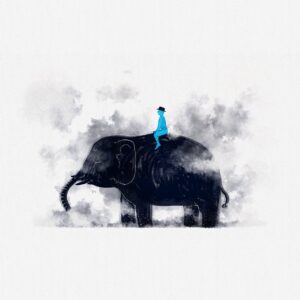En la civilización sumeria, la religión desempeñó un papel fundamental en la vida diaria de sus habitantes. Los sumerios crearon una vasta cantidad de deidades y seres sobrenaturales que eran venerados y temidos a la vez. Sin embargo, entre todas esas deidades, hay siete que destacaban sobre las demás por su importancia en la religión y la mitología sumerias.
Uno de los dioses más importantes era Inanna, una diosa femenina asociada con la sexualidad, la fertilidad y la guerra. Recibió una gran veneración en la cultura sumeria y, cuando los asirios adoptaron su culto, se convirtió en uno de los dioses más importantes de su panteón.
Enlil, el dios en sumerio del aire y las tormentas, era considerado el creador del mundo. Según la mitología sumeria, Enlil separó al cielo y la tierra de sus padres y, gracias a ello, fue capaz de crear la vida y la civilización. Su poderoso atributo lo convierte en un dios fundamental para los sumerios.
An, el dios en sumerio del cielo, compartió un papel importante con Enlil en las mitologías sumerias. Sin embargo, fue en otro lado de la escala divina donde encontramos a Utu, el dios del sol y la justicia. Su función era fundamental para resolver disputas políticas y mantener el orden social.
Los Siete Dioses del Mito Sumerio
En la mitología sumeria, hay una agrupación de siete dioses que tienen un papel fundamental en la creación del mundo y la vida. Entre estos dioses, encontramos a Inanna, como ya mencioné anteriormente, una diosa femenina ligada a la sexualidad, la fertilidad y la guerra.
Además de Inanna, otro dios fundamental es Enlil, el dios en sumerio del aire y las tormentas. Según la mitología, Enlil fue el creador del mundo, separando el cielo y la tierra y permitiendo la vida y la civilización surgir. Sin embargo, no fue solo Enlil el que participó en este proceso creativo, ya que An, el dios en sumerio del cielo, también tuvo un papel importante.
En Utu, el dios del sol y la justicia, encontramos a una deidad importante para el orden social y político. Su función era resolver disputas y mantener el equilibrio en la sociedad sumeria. De manera similar, Nanna/Nannar, el dios de la luna, se convierte en un protegedor del rebaño y los pastores, así como también es el símbolo de sabiduría y astrología.
Por otro lado, Ninhursag, una deidad femenina, cumplió un papel crucial como la madre de todas las diosas. Fue protectora de mujeres y niños, y se le atribuían funciones similares a Utu, como la protección de la vida y la tierra. Finalmente, Nammu, el dios en sumerio de las aguas primordiales, es considerado el símbolo del inicio de la vida, la creación y el nacimiento.
En la religión sumeria, estos dioses estaban relacionados mediante complejos rituales y ceremonias, que buscaban mantener el equilibrio entre el mundo divino y el mortal. A través de la adoración a estos dioses, los sumerios esperaban encontrar protección, prosperidad y sabiduría en sus vidas cotidianas.
La Creación y la Abundancia en los Dioses sumerios
La creación y la abundancia son temas centrales en la religión sumeria, y muchos de los dioses mencionados anteriormente tienen un rol importante en este sentido. El propio Enlil se considera el creador del mundo, separando el cielo y la tierra y permitiendo la vida y la civilización surgir.
Enanna, por otro lado, es la diosa asociada con la fertilidad y la abundancia. Fue venerada como la que protegía el trigo, las cebadas y otros cultivos importantes para la subsistencia sumeria. Su culto se centraba en rituales y ofrendas que buscaban garantizar crecimientos abundantes y cosechas exitosas.
An, el dios en sumerio del cielo, también tiene un papel importante en la creación y la abundancia. Se cree que An envió a los seres humanos para que se quedaran en la Tierra y hicieran prosperar sus cultivos y hogares.
Por otro lado, Ninhursag, como la madre de todas las diosas, está estrechamente relacionada con la creación y la abundancia. Fue venerada como la protectora de mujeres y niños, y se le atribuían funciones similares a Utu, como protección de la vida y la tierra.
En este sentido, los sumerios crearon una conexión cercana entre sus dioses y la fertilidad de la tierra. Rituales y ofrendas eran comunes en la religión sumeria para garantizar la crecida de las cosechas y el bienestar de las comunidades.
Enlil, el Padre del Mundo & El Aire
Enlil es uno de los dioses más importantes en la mitología sumeria, y su rol como padre del mundo y protector del aire es fundamental en la creación y mantenimiento del universo.
Según la mitología sumeria, Enlil era el hijo primogénito de An, el dios en sumerio del cielo. Fue Enlil quien se encargó de crear el mundo separando el cielo y la tierra, y fue desde ese momento que Enlil se convirtió en el patrón del Aire y las tormentas.
Enlil es conocido por su poder sobre los espíritus y los demonios, y se cree que era capaz de influir en el clima y las condiciones atmosféricas. De hecho, en la mitología sumeria, Enlil fue quien creó los vientos y las tormentas para mantener el orden en el universo.
A su vez, los sumerios veneraban a Enlil como un dios que protegía a sus súbditos de enfermedades y desastres naturales. Además, Enlil era considerado como el patrono de la industria y el comercio, ya que fue él quien llevó la civilización a las tierras bajas y les permitió desarrollar culturas y economías.
Aunque Enlil no es un dios excesivamente temido o misterioso en la mitología sumeria, su importancia como padre del mundo y protector del aire está claramente establecida. Su rol en la creación y mantenimiento del universo es fundamental en la cosmogonía sumeria, y sigue siendo un personaje importante en la religión y la cultura sumerias.
An, El Cielo y la Tierra.
An está vinculado estrechamente a la creación y el mantenimiento del universo en la mitología sumeria. Como dios del cielo, se cree que An era el responsable de la creación del mundo y la separación entre el cielo y la tierra.
Según la mitología sumeria, An fue quien creó el primer hombre y la primera mujer, Adapa y Hammurabi, y los envió a la Tierra para que prosperaran y se asentaran. An también es conocido por ser el dios que protege a las estrellas y el firmamento celestial.
Enlil, como hijo de An, se convirtió en el patrón del Aire y las tormentas. En este sentido, An y Enlil trabajan juntos para mantener el orden en el universo y garantizar la crecida de las cosechas y el bienestar de las comunidades.
An también es considerado como un dios benévolo que protege a las personas y animales, y se le atribuye la responsabilidad de preservar la armonía entre los procesos naturales y la vida humana.
An es un dios fundamental en la mitología sumeria, ya que conecta el cielo con la Tierra y representa la creación y el mantenimiento del universo. Su relación con Enlil y otros dioses sumerios forma parte de la cosmogonía sumeria y refleja la búsqueda de los sumerios hacia la estabilidad y la prosperidad en su entorno natural.
Inanna: la Diosa de la Guerra y la Fruto.
Inanna es una de las diosas más importantes en la mitología sumeria, y es conocida por ser la diosa de la guerra y los productos frutales.
Enanna es descrita como una diosa poderosa y bella, con el cabello rojo y la piel blanca. Era considerada la reina de Uruk, uno de las ciudades más importantes en Sumeria. Como diosa de la guerra, Inanna era venerada por sus habilidades militares y su capacidad para proteger a los sumerios de ataques extranjeros.
En contraste con esta faceta agresiva, Inanna también era conocida como una diosa de la fruta, especialmente del aceite y las cebadas. Se cree que Inanna era responsable de la crecida y cosecha de estos productos agrícolas importantes en la sociedad sumeria.
Inanna es quizás más famosa por su mito con Dumuzi, el dios del amor y la vegetación, en el que se dice que la diosa desciende al inframundo para rescatar a Dumuzi de las garras de Enlil. Esta historia ha sido interpretada como un ritual de fertilidad y crecida agrícola, en el que Inanna representa la fuerza vital del universo.
Inanna también es conocida por su relación con Gilgamesh, el rey legendario de Uruk, con el que se dice que mantuvo una relación amorosa. En esta mitología, Inanna es descrita como una diosa que ayuda a Gilgamesh en su búsqueda de la inmortalidad y le proporciona consejos y protección.
Inanna es una diosa sumeria multifacética que representa tanto la fuerza militar y la fertilidad agrícola como la belleza y el amor. Su mitología y culto se han mantenido importantes en el mundo antiguo y siguen siendo objeto de estudio y admiración en la actualidad.
Ningishzida, el dios del sacrificio
Ningishzida (también conocido como Nindukura) es un dios sumerio importante que se asociaba con el sacrificio, particularmente el sacrificio animal en honor a los dioses y la protección de la ciudad. Era una divinidad conectada al inframundo y se creía que era responsable del mantenimiento de las condiciones eclesiásticas y sociales en la sociedad sumeria.
Se dice que Ningishzida era un dios severo y exigente, que esperaba la devoción y el respeto de los humanos. Según la mitología sumeria, Ningishzida fue uno de los primeros dioses que creó el Dios Enlil, jefe de los dioses sumerios.
En las ciertas ceremonias religiosas, se ofrecían sacrificios a Ningishzida para asegurar la protección y la prosperidad de la ciudad y su gente. Por ejemplo, en caso de guerra o enfermedad, se hacían ofrendas a este dios para obtener su ayuda y protección.
En la cosmogonía sumeria, Ningishzida era considerado como el dios que mantenía el equilibrio entre la vida y la muerte. Fue uno de los dioses que ayudaron a crear el mundo y se creía que tenía una cierta conexión con los procesos naturales.
Ningishzida es un dios sumerio importante relacionado con el sacrificio y la protección de la ciudad y su gente. Era considerado severo y exigente, pero también poderoso en mantenimiento del equilibrio entre la vida y la muerte. Su culto y mitología siguen siendo objeto de estudio por los historiadores y religiosos.
Ninhursag, la Madre de Todas las Diosas
Ninhursag (también conocida como Harnursag o Baba) es una diosa sumerica importante que se asocia con la naturaleza, la fertilidad y la maternidad. Era considerada la madre de todas las diosas sumerias y se le atribuía la responsabilidad de proteger a las mujeres y los niños.
Ninhursag era una divinidad poderosa y benéfica que se asociaba con el nacimiento y el crecimiento. Se cree que era responsabilizada por la protección maternal y la curación de enfermedades relacionadas con la maternidad y la fertilidad.
En la mitología sumeria, Ninhursag se describe como una diosa fuerte y protectora que defendía a las mujeres y los niños contra la opresión y el peligro. Era considerada una deidad importante en la cosmogonía sumeria, ya que se creía que ella había ayudado a Enlil a creador del mundo.
Ninhursag era también una diosa de la vegetación y la fertilidad. Se le atribuía la responsabilidad de proteger los productos agrícolas y las cosechas, lo que reflejaba su papel en la maternidad y la curación.
En algunos mitos sumerios, Ninhursag se describe como una diosa que había sido violada por el dios Enki, quien después fue castigado por su acción. Esto puede ser visto como un reflejo de la importancia que se le daba a la protección y el respeto hacia las mujeres en la sociedad sumeria.
Ninhursag es una diosa sumerica poderosa y benéfica que se asocia con la naturaleza, la fertilidad y la maternidad. Era considerada la madre de todas las diosas sumerias y se le atribuía la responsabilidad de proteger a las mujeres y los niños contra el peligro y la opresión. Su culto y mitología siguen siendo objeto de estudio por los historiadores y religiosos.
Nanna (Nannar): el Dios del Sol y la Luna
Nanna (también conocido como Nannar) es un dios sumerio importante que se asocia con el sol, la luna y la astrología. Era considerado el esposo de Inanna, la diosa del amor y la guerra.
En la mitología sumeria, Nanna era descrito como un dios benevolente que se encargaba de la creación y el mantenimiento del universo. Era responsable de controlar los ciclos naturales de la luna y el sol, lo que reflejaba su papel en la agricultura y la fertilidad.
Nanna era también considerado el Protector de las Bestias Pastores, ya que se le atribuía la responsabilidad de proteger a los pastores y los rebaños. En este sentido, era un dios asociado con la naturaleza y la vida silvestre.
En el contexto religioso sumerio, Nanna era una divinidad importante en la astronomía y la astrología. Se creía que sus movimientos en el cielo influences los eventos humanos y la suerte de las personas.
Nanna también tenía un papel como dios de la sabiduría y la justicia. En algunas tradiciones, se le atribuía la responsabilidad de dictar sentencias justas y mantener el orden social y moral.
Nanna es un dios sumerio importante que se asocia con el sol, la luna y la astrología. Era considerado un dios benevolente, protector de los pastores y los rebaños, y tenía un papel central en la astronomía y la astrología sumerias.
Nammu: El Dios de las Aguas Primordiali.
Nammu (también conocido como Nunamse o Nanam) es un dios sumerio importante que se asocia con el agua primordial, el nacimiento y la creación. Era considerado el Dios Principal de la Creación y el Padre de todos los dioses y monstruos marinos.
En la mitología sumeria, Nammu era descrito como una divinidad primordial que surgía del caos y se encargaba de crear el mundo a partir del agua. Se creía que fue el primer dios en surgir desde las aguas y que fundó el orden natural y los ciclos naturales.
Nammu era relacionado con la agricultura y la fertilidad, ya que se le atribuía la responsabilidad de dar vida a la tierra y hacer crecer las plantas. En este sentido, era un dios asociado con la fertilidad y el nacimiento.
En algunas tradiciones, Nammu era considerado como el esposo de Ninhursag, la diosa madre, y juntos habían creado los primeros humanos y animales.
Nammu también tenía un papel en las ciencias sumerias, ya que se creía que su poder sobre las aguas primordiales influenciaba el clima y el tiempo. En este sentido, era un dios importante para la agricultura y la supervivencia humana.
Nammu es un dios sumerio importante que se asocia con el agua primordial, el nacimiento y la creación. Era considerado el Dios Principal de la Creación y el Padre de todos los dioses y monstruos marinos.
Conclusión
Los 7 dioses sumerios más importantes son :
- Inanna: Diosa femenina de sexualidad, fertilidad y guerra
- Enlil: Dios del aire, el viento y las tormentas, considerado como el creador del mundo
- An: Dios del cielo, pero con un rol que se compartió con Enlil en las mitologías sumerias
- Utu: Dios del sol y la justicia, importante para resolver disputas políticas
- Ninhursag: Representó a la madre de todas las diosas, protectora de mujeres y niños, y asociada con la vida y la tierra
- Nanna/Nannar: Dios de la luna, astrología y sabiduría, protector de los pastores y rebaños
- Nammu: Diosa de las aguas primordiales, símbolo del inicio de la vida, el nacimiento y la creación
Estos dioses eran fundamentales en la religión sumeria y se asocian con aspectos naturales como la agricultura, la fertilidad, la justicia y la creación. A través de su culto y mitología, los sumerios buscaban protección del bien común, paz y éxito en las labores cotidianas.
La comprensión de estos dioses y sus roles nos permite profundizar en la cultura sumeria y descubrir el valor que se les otorgaba a la naturaleza, la familia y la comunidad.










